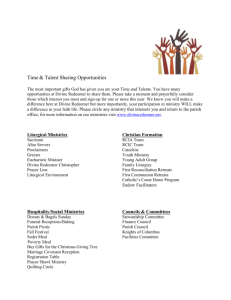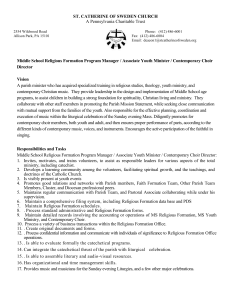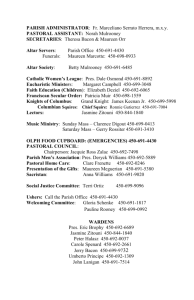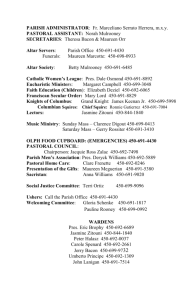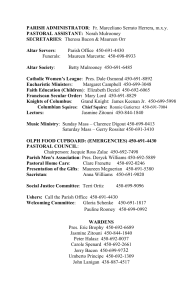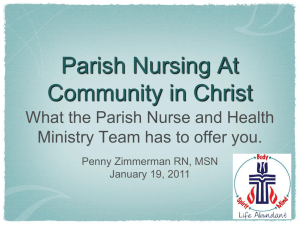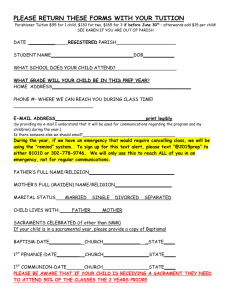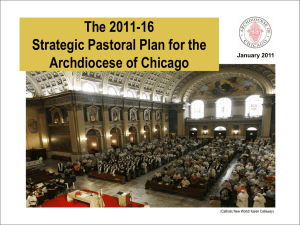Management Practices that Make Ministry More Effective
advertisement
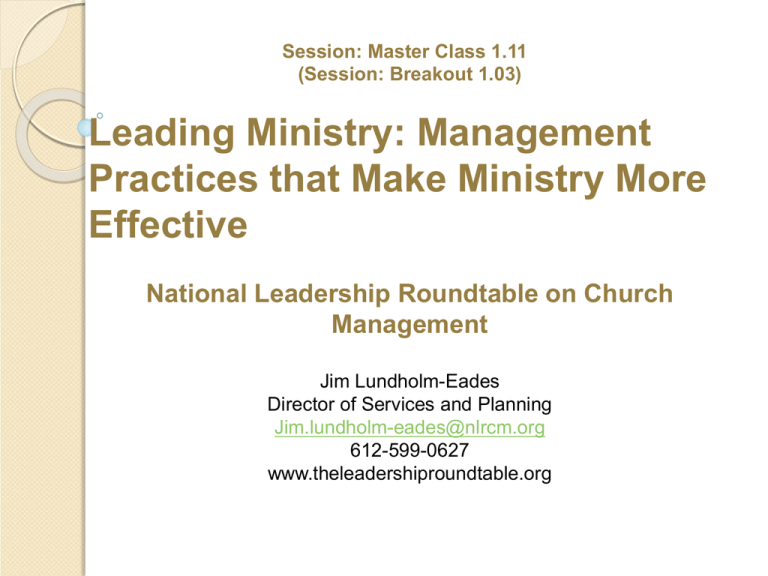
Session: Master Class 1.11 (Session: Breakout 1.03) Leading Ministry: Management Practices that Make Ministry More Effective National Leadership Roundtable on Church Management Jim Lundholm-Eades Director of Services and Planning Jim.lundholm-eades@nlrcm.org 612-599-0627 www.theleadershiproundtable.org The Leadership Roundtable – To promote excellence and best practices in the management, finances and human resource development of the Catholic Church in the U.S. by greater incorporation of the expertise of the laity. – To work in collaboration with the U.S. bishops and other church leaders, promoting dialogue and fostering the full utilization of the unique gifts of experts in management, finance and human resources – To identify best practices in the areas of management, finance and human resources to further fulfill the church’s mission by promoting, adapting and applying these practices 4/13/2015 2 GROWTH Great Management: Why Now? The Challenge TIME 4/13/2015 3 Great Church Management Management Priority Number 1 4/13/2015 5 Internal Parish and School Relationships SUPERVISORY (Work Direction) CONSULTATIVE EMPLOYER – EMPLOYEE PASTORAL 4/13/2015 6 Parish and School Leadership: A and B Parish Leadership PARISH AND SCHOOL LEADERSHIP B PASTOR Finance Council Staff Leadership Pastoral Council Staff PARISH AND SCHOOL LEADERSHIP A 4/13/2015 7 Trust in Parishes and Schools 4/13/2015 8 Delegating: What are you delegating? AN INTENTIONAL CHOICE: ◦ ◦ ◦ ◦ ◦ ◦ Tasks Functions Relationships Authority Responsibility Power ◦ Control ◦ My role as Pastor, principal, teacher, manager, minister, etc. 4/13/2015 9 Levels of Delegation LEVEL 1 The supervisor says: What is to be done How to do it When it is to be done What standards are expected LEVEL 2 The supervisor says: What is to be done How to do it The worker determines: When it is to be done What standards are expected 4/13/2015 LEVEL 3 The supervisor says: What is to be achieved The worker determines: How to do it When it is to be done What standards are expected 10 What grabs my attention? AMPLITUDE + FREQUENCY MASS = WHAT YOU SEE 4/13/2015 11 Changes 4/13/2015 12 What Do Great Managers Manage? People: Act justly, walk tenderly, …… Accountability: Co-responsibility: evaluate, be consistent, be transparent Performance Indicators: Measure effectiveness, impact, outcomes Benchmarks: Compare with timelines Best Practices: Compare with the best 4/13/2015 13 Catholic Transparency 1. 2. 3. 4. 5. 6. 7. 8. They can get a copy in the office. We told them. We explained to them. We made time for them to ask questions. We got them talking to each other about it. We fed back what we were hearing. They gave us a lot of ideas. We engaged them. 4/13/2015 14 LOW Preference for Culture O HIGH Assessing Parish and School Capacity for Mission LOW Preference for Culture L 4/13/2015 HIGH 15 Resentful and PassiveAggressive Zone Political and Defensive Zone Culture L is abdicated Culture O and Culture L are in active conflict Leaderless and Directionless Zone Boundary-less and “Anything Goes” Zone Culture O and Culture L are abdicated Culture O is abdicated LOW Preference for Culture O HIGH Assessing Parish and School Capacity for Mission LOW Preference for Culture L 4/13/2015 HIGH 16 Resentful and PassiveAggressive Zone Political and Defensive Zone Culture L is abdicated Culture O and Culture L are in active conflict LOW Preference for Culture O HIGH Assessing Parish and School Capacity for Mission Robust Communio Zone Mutual Appreciation for Culture O and L by each culture emerging from shared Acknowledgement and Respect Leaderless and Directionless Zone Boundary-less and “Anything Goes” Zone Culture O and Culture L are abdicated Culture O is abdicated LOW Preference for Culture L 4/13/2015 HIGH 17 Governance is not Management Mission Finances A sense of who your Boss is Clearly Catholic Identity 4/13/2015 18 Choosing Between Good Ideas 4/13/2015 19 Answers to Every Question Three helpful phrases I don’t know. I have to think about that. What do you think? The Pocket Trick That is important, let me make a note about that……. Separate the important from the urgent. Very, very few questions and issues are both important and urgent and need to be answered today. 4/13/2015 20 Consultation: The Church at its Best PUBLIC Democratic Process Representation Recommendations Political: Win/Lose Defined and controlled outcomes Discussion Concussion, Percussion, An event CHURCH Discernment Process The Mission of the Church Options The will of God Steps in the journey Dialogue, Reflection, Contemplative A way of life 4/13/2015 21 Consultative Groups THREE KEYS TO COUNCIL AND BOARD SUCCESS A SHARED UNDERSTANDING OF REALITY A SHARED UNDERSTANDING OF THE MISSION OF THE CHURCH UNIVERSAL A PLAN A BUDGET 4/13/2015 22 The Financial Position of the Parish and School 1. The financial position of the parish is the financial position of the school and visa versa 2. Pay the current obligations “Can we meet payroll, pay for utilities, etc. in this six to twelve months?” 3. Understand the long term obligations “What are the revenue and expense trends for the next two to three years?” “Tell me about any long term debt obligations? 4/13/2015 23 A Word on Budgets A budget is a primarily a pastoral document A budget is a plan with numbers attached: The plan comes first Mission driven – Data informed Key assumptions are explicit Everybody is responsible for keeping planning options congruent with financial reality 4/13/2015 24 PARTNERS IN EXCELLENCE Over 400 Partners in Excellence 8 Dioceses | 76 Parishes | 34 Nonprofits (with 409 parishes) (representing 40 Dioceses) (including 2 religious communities) 4/13/2015 26 Standards Content Eight Guiding Principles: • • • • Mission and Ministry Program Governance & Advisory Bodies Conflict of Interest Human Resources • • • • Financial and Legal Openness Fundraising Public Policy and Public Affairs Fifty-five Standards detailed performance benchmarks Conforms with canon law and civil laws 4/13/2015 27 Sample Resource Packet Titles Developing and Revising the Mission Statement Ministry Program Evaluation Ongoing Planning by Advisory Bodies Compensation and Employee Evaluation Conflict of Interest Personnel Policies and Employee Orientation Volunteer Policies Financial Planning and Monitoring Reporting Financial Improprieties Financial Policies Legal Compliance Checklist Legal Compliance – Liability Issues Openness Fundraising Costs Fundraising Practices Solicitation and Acceptance of Gifts Public Policy Advocacy Promoting Public Participation Efforts to Educate the Public 4/13/2015 28 Sample Standard: Human Resources (27) Parishes should have a system in place for regular written evaluation of employees by their respective supervisors, which should take place at least annually. 4/13/2015 29 Sample Standard: Advisory Bodies (16) The parish pastoral council and finance council are each responsible for its own operations, including the orientation, education, training and development of members, periodic (i.e., at least every two years) evaluation of its own performance, and where appropriate, the selection of new members. 4/13/2015 30 Sample Standard: Ministry Program Evaluation (3) A parish should have defined, costeffective procedures for evaluating, both qualitatively and quantitatively, its ministry programs and projects in relation to its mission. Where appropriate, these procedures should address programmatic efficiency and effectiveness, the relationship of these impacts to the cost of achieving them, and the outcomes for program participants. Evaluations should include input from program participants/recipients. 4/13/2015 31 www.CatholicStandardsForExcellence.org 4/13/2015 32 Forum for Members 4/13/2015 33 Questions & Contact Information What grabbed your attention? Other questions? Jim Lundholm-Eades National Leadership Roundtable on Church management 612-599-0627 Jim.lundholm-eades@nlrcm.org www.theleadershiproundtable.org 4/13/2015 34

